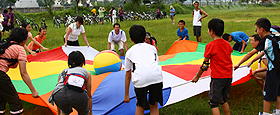
Elderly Services
TWGHs conducted a Press Conference: “Effectiveness of a Cultural-specific Music Intervention in Managing Agitation among Elderly with Dementia in Hong Kong”
Study proved that music and movement intervention could improve the mood and agitated behaviors of elderly with dementia.
The Elderly Services Section of Tung Wah Group of Hospitals (TWGHs) has invited Centre on Behavioral Health, The University of Hong Kong (CBH of HKU) to conduct a study about music and movement intervention on the elders with dementia from October 2014 to September 2015, aiming at improving their behavioral and psychological symptoms. This project is supported by the Social Welfare Development Fund (Phase 2) of Social Welfare Department.
Press conference of “Effectiveness of a Cultural-specific Music Intervention in Managing Agitation among Elderly with Dementia in Hong Kong” was launched on 14 June 2016. Dr. Rainbow Ho, Director of CBH, Ms Alice Leung, Assistant Community Secretary (Elderly Services) of TWGHs introduced the research findings. Live demonstration of the group activity and sharing were also provided in the press conference. Study reports, tool cards and caring tips were distributed to the service providers and carers as reference in order to promote the music and movement intervention and benefited more number of elderly with dementia.
Before the start of the project, the research team collected information about the musical taste of the local elderly (aged 65 to 80) in the TWGHs residential homes as well as their activity levels. Then, a team comprised experienced music therapist, dance-movement therapist, expressive arts therapist and art psychotherapist worked together to design an intervention for the elderly using localized music, and depending on their activity levels, integrated with simple motor movement to provide the elderly with activities that are comprised of multiple stimulations, such as sensory, emotion, imagery, and memory and aimed at improving their mood and agitated behaviors.
A total number of 73 elderly with dementia from 10 TWGHs residential homes participated in this research. They were divided into experimental and control groups. On one hand, elders in the experimental group participated in an 8-week intervention, two sessions per week and each session lasted for 30 minutes, led by an Expressive Arts Therapy Trainee from HKU and a Social Worker from TWGHs. On the other hand, elders in the control group received usual care. The staff in TWGHs recorded the behavioral and psychological symptoms of the elderly before, in the middle and at the end of the intervention.
The research results indicated that improvement was found in agitated behaviors, aberrant motor behaviors, irritability, dysphoria and subjective mood among elders in the experimental group, in which, improvements in agitated behaviors, dysphoria and subjective mood reached a statistically significant level. The improvement rates ranged from 14.4 to 57.1%.
This research result confirmed the effectiveness of the use of non-pharmacological treatment, especially using arts as a media of the intervention for improving the behavioral and psychological symptoms among elders with dementia.

Dr. Rainbow Ho, Director of Centre on Behavioral Health, The University of Hong Kong (left 2), Ms Alice Leung, Assistant Community Secretary (Elderly Services) (central) accompanied with supervisor of Elderly Home and services users to present in the press conference

The elderly and carers being led by our staff had demonstrated the music and movement intervention in the press conference.

Study report, activity cards and “10 tips of caring parents with dementia”







